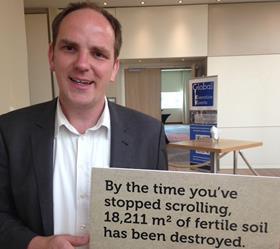
At last week’s Sustainable Foods Summit in Amsterdam, organised by Organic Monitor, delegates heard about the importance of sustainability and the need continuously to evolve in order to meet sustainability targets.
“Sustainability is an abused word,” said Tobias Bandel, managing partner of Soil & More, a subsidiary of Dutch organic group Eosta. “You will not find a company that does not have a strategy on sustainability, regardless of what they do. But for us, sustainability is the ability to sustain in changing circumstances, so in reality you have to go beyond merely sustaining.”
A major focus of Bandel’s presentation, and of this year’s summit due to 2015 being named the UN’s International Year of Soils, was the need to do more to protect our soils; he warned that the threat of desertification loomed equally over countries in Europe and was not limited to the likes of Egypt or South Africa.
To illustrate the point, Bandel showed a video illustrating the difference between the water-holding capacity of soil exploited using crop rotation and that worked intensively with one crop.
A handful of soil intensively worked allowed water to pass almost freely through, whereas the other soaked it up and held it in; in the first scenario, the soil requires more water and fertiliser, therefore increasing costs. “Healthy soil is not just nice to have,” concluded Bandel, “it is an ecological and economic necessity.”
But Bandel stressed that organic wasn’t the only way to address these issues. “There are good farmers and not so good farmers,” he explained. “If you’re an organic farmer you’re clearly likely to follow some good practices. However, I’ve seen conventional growers who are way more sustainable than organic farmers.”
He also touched on the need to examine the reasons behind the diminishing value of food in the eyes of consumers. “We must think about what’s gone wrong in the last 10-20 years that food is given practically no value today,” he said. “We need a re-evaluation. We can't complain that it's too expensive and then throw away 40 per cent of it.”



